Furnace Repair Coventry
Find top Furnace Service in Coventry
Get 3 FREE Furnace Service quotes for your project today! Compare profiles, reviews, accreditations, portfolio, etc... and choose the best offer.

Meriden Plumbing & Heating
517 reviewsOffice 2, 85 Priory Road, Kenilworth, CV8 1LQ, GBMeriden Plumbing and Heating is an experienced plumbing and heating business serving domestic and commercial clients across Coventry and Warwickshire. We offer a wide range of services, including boiler installations, repairs, servicing, gas safety certificates, unvented cylinders, underfloor heating, bathroom installations, and all aspects of plumbing and heating repairs. We are Gas Safe registered and our engineers are known for providing personalised services to suit individual needs. We pride ourselves on delivering an outstanding service to exceed expectations. We are professional, reliable, friendly, and punctual. We offer a free initial consultation to discuss your needs and provide an affordable solution.
- Services
- Why Us?
- Accreditations
- Our Team
- Testimonials
- Gallery
Get Quote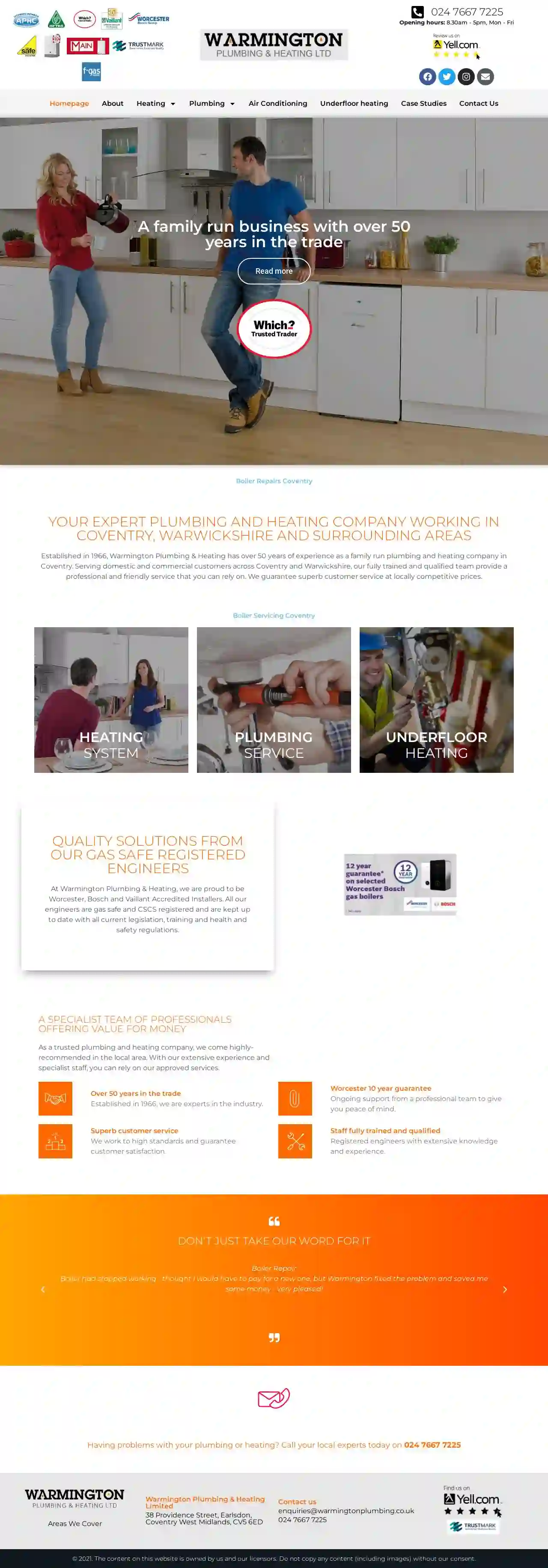
Warmington Plumbing & Heating Ltd | Boiler Repairs Coventry | Maintenance | Servicing | Central Heating | Gas Engineers
4.623 reviews38 Providence Street, Earlsdon, CV5 6ED, GBA family run business with over 50 years in the trade YOUR EXPERT PLUMBING AND HEATING COMPANY WORKING IN COVENTRY, WARWICKSHIRE AND SURROUNDING AREAS Established in 1966, Warmington Plumbing & Heating has over 50 years of experience as a family run plumbing and heating company in Coventry. Serving domestic and commercial customers across Coventry and Warwickshire, our fully trained and qualified team provide a professional and friendly service that you can rely on. We guarantee superb customer service at locally competitive prices. At Warmington Plumbing & Heating, we are proud to be Worcester, Bosch and Vaillant Accredited Installers. All our engineers are gas safe and CSCS registered and are kept up to date with all current legislation, training and health and safety regulations. As a trusted plumbing and heating company, we come highly-recommended in the local area. With our extensive experience and specialist staff, you can rely on our approved services. Over 50 years in the trade Established in 1966, we are experts in the industry. Superb customer service We work to high standards and guarantee customer satisfaction. Worcester 10 year guarantee Ongoing support from a professional team to give you peace of mind. Staff fully trained and qualified Registered engineers with extensive knowledge and experience. DON’T JUST TAKE OUR WORD FOR IT Excellent Service Natalie and the team are always a pleasure to do business with, they provide an excellent service! Prompt service Thank you very much for your prompt service,your engineer quickly found the fault and did the repair quickly and efficiently mended it. Lovely to have heat and hot water again Thank you again. - EUNICE Jones Excellent Service Fixed my boiler first time - great price too! Boiler Repair Boiler had stopped working - thought I would have to pay for a new one, but Warmington fixed the problem and saved me some money - very pleased! Having problems with your plumbing or heating? Call your local experts today on 024 7667 7225
- Services
- Why Us?
- Accreditations
- Our Team
- Testimonials
- Gallery
Get Quote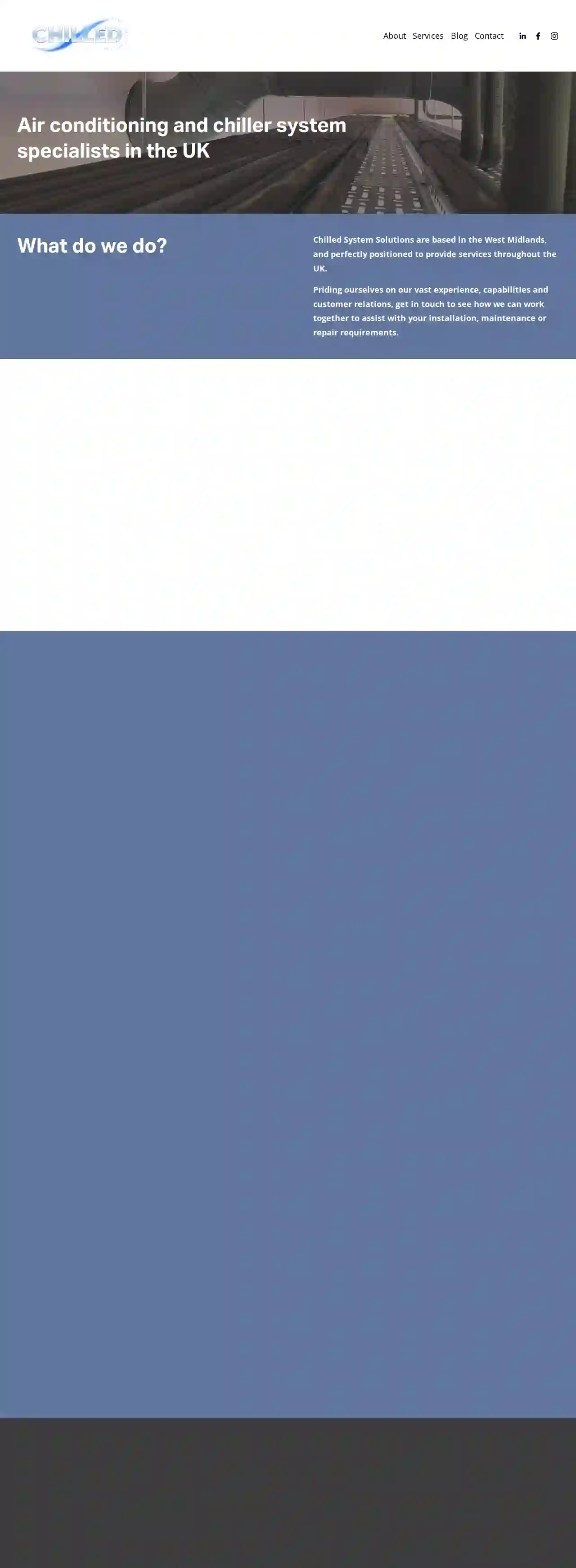
Chilled System Solutions Ltd
Bayton road industrial estate, Unit 6 Brindley Road, Coventry, CV7 9EP, GBChilled System Solutions Ltd is an Air Conditioning Company based in Coventry in the West Midlands. Close to Birmingham and the surrounding motorway system we can easily provide services to the whole of the United Kingdom.We specialise in the Installation, Maintenance and Repair of all Air Conditioning systems. Be it a small split system, Large capacity VRF or 1 Mw Water chiller, our highly experienced team can assist whatever you need.Contact us today or have a look around our website if you require more specific information on how we can help.Our priority is our customers and we pride ourselves on our engineering experience, our customer support and relationships.
- Services
- Why Us?
- Accreditations
- Gallery
Get Quote
Three Spires Coventry Gas Engineer Boiler Repair
4.969 reviews156 Rotherham Road, Coventry, CV6 4FR, GBThree Spires Heating and Plumbing Ltd is your premier destination for high quality plumbing services in Coventry. With over 7 years of experience, our commitment to excellence and dedication to customer satisfaction make us the leading choice for all your plumbing needs in Coventry and surrounding areas.
- Services
- Why Us?
- Testimonials
- Gallery
Get Quote
MacGas Heating Ltd
568 reviews330 Goodyers End Ln, Bedworth, CV12 0HY, GBMacGas Heating Ltd is a local boiler repair, boiler servicing and heating experts in Coventry, Nuneaton, Hinckley, Rugby & surrounding areas. With over 15 years of experience, we provide a wide range of services including boiler installation, central heating, underfloor heating, and plumbing. Our team of experts is dedicated to providing excellent customer service and ensuring that our customers receive the highest quality workmanship. We are proud to have a 100% customer satisfaction rate and have completed over 1000 projects. We work with trusted suppliers and are committed to providing the best service for our customers.
- Services
- Why Us?
- Our Team
- Testimonials
- Gallery
Get Quote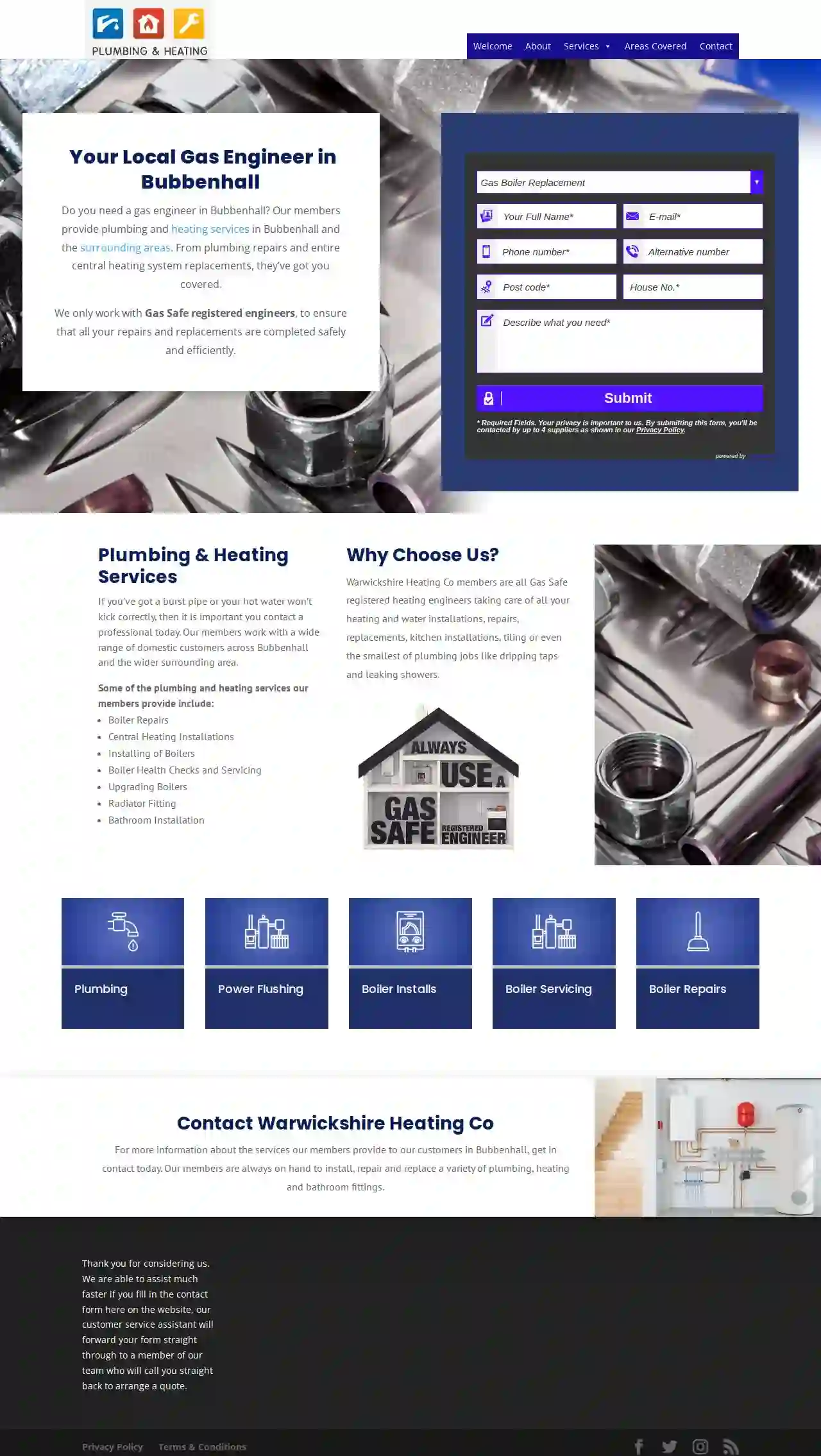
Elite Gas Plumbing & Heating
Coventry, GBWarwickshire Heating Co provides plumbing and heating services in Warwickshire and the surrounding areas. Our members are Gas Safe registered engineers, ensuring all repairs and replacements are completed safely and efficiently. We offer a range of services, including boiler repairs, central heating installations, boiler health checks and servicing, upgrading boilers, radiator fitting, and bathroom installation. Our team is dedicated to providing excellent customer service and ensuring that all our customers receive the highest level of workmanship and professionalism.
- Services
- Why Us?
- Gallery
Get Quote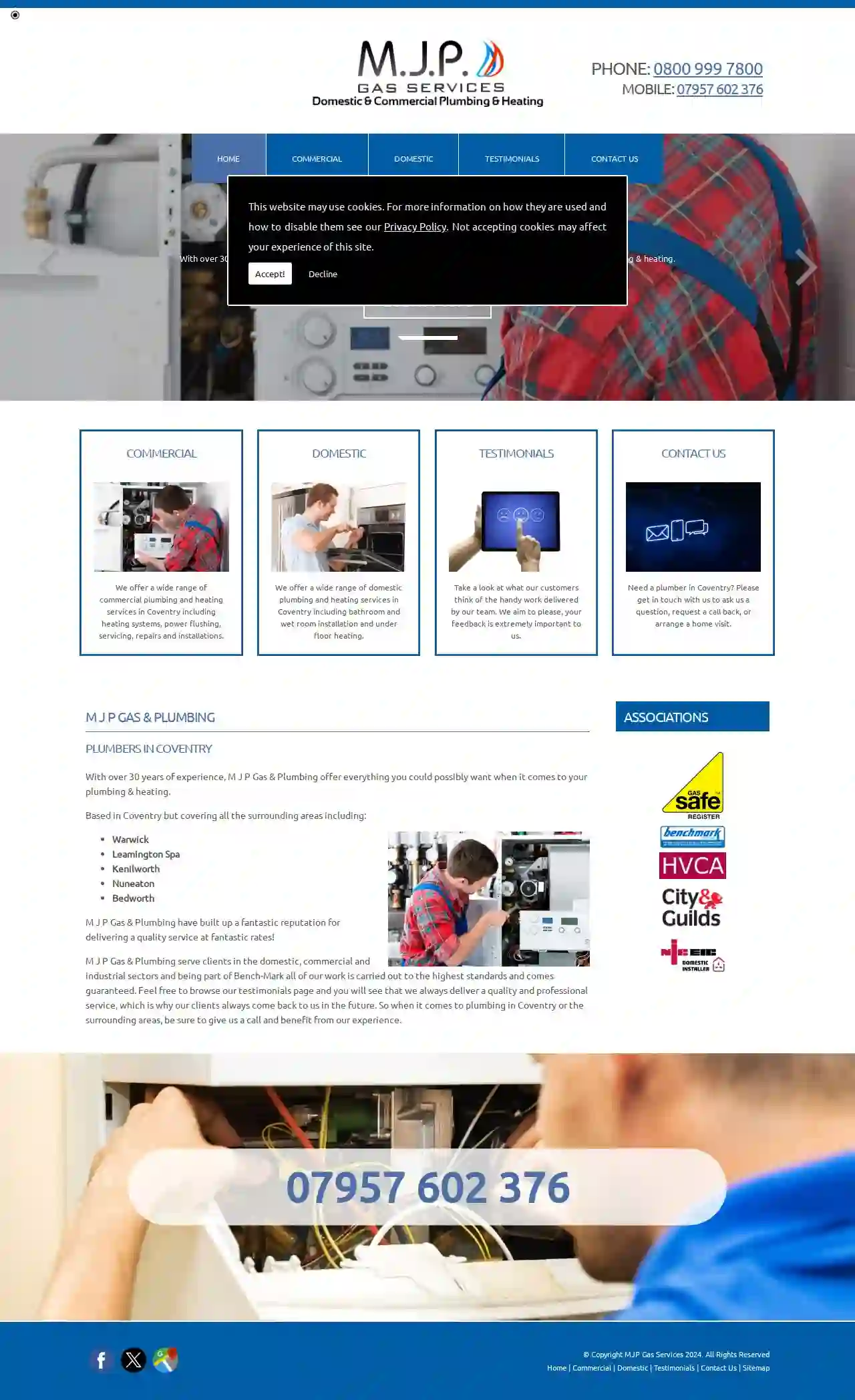
M J P Gas Services - Domestic & Commercial Plumbing & Heating - Coventry
52 reviewsCoventry, GBWith over 30 years' experience, we can offer you everything you could possibly need when it comes to your plumbing & heating. We provide a range of services to domestic clients, including but not limited to: Boiler installation & repair, power flushing and kitchen installations. We also offer a wide range of commercial plumbing and heating services in Coventry including heating systems, power flushing, servicing, repairs and installations. Our team is dedicated to delivering a quality service at fantastic rates! We serve clients in the domestic, commercial and industrial sectors and being part of Bench-Mark all of our work is carried out to the highest standards and comes guaranteed.
- Services
- Why Us?
- Accreditations
- Our Team
- Testimonials
- Gallery
Get Quote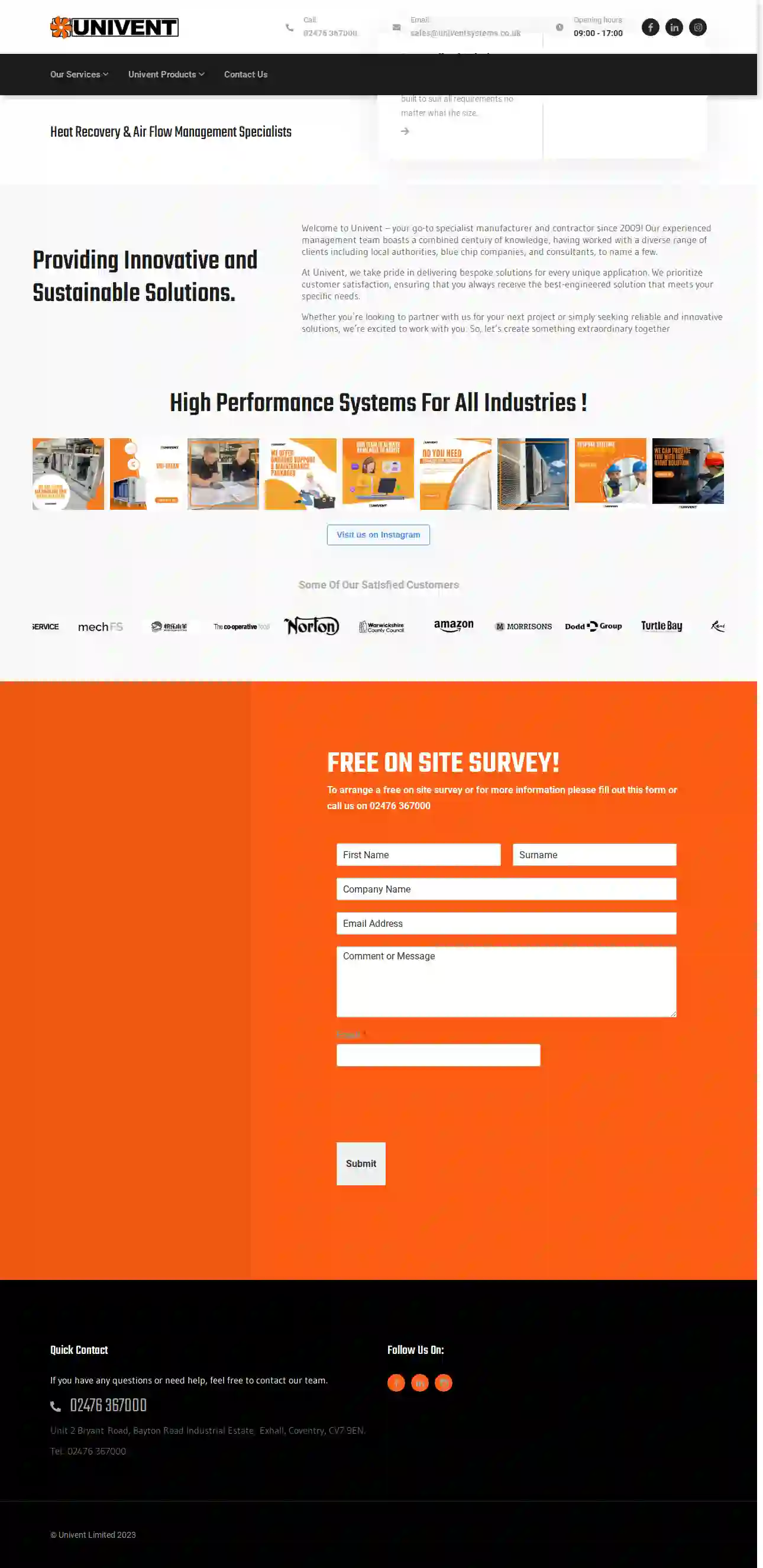
Univent Systems Limited
4.811 reviewsBayton Road Industrial Estate, Unit 2 Bryant Road, Coventry, CV7 9EN, GBWelcome to Univent – your go-to specialist manufacturer and contractor since 2009! Our experienced management team boasts a combined century of knowledge, having worked with a diverse range of clients including local authorities, blue chip companies, and consultants, to name a few.At Univent, we take pride in delivering bespoke solutions for every unique application. We prioritize customer satisfaction, ensuring that you always receive the best-engineered solution that meets your specific needs.Whether you’re looking to partner with us for your next project or simply seeking reliable and innovative solutions, we’re excited to work with you. So, let’s create something extraordinary together
- Services
- Why Us?
- Gallery
Get Quote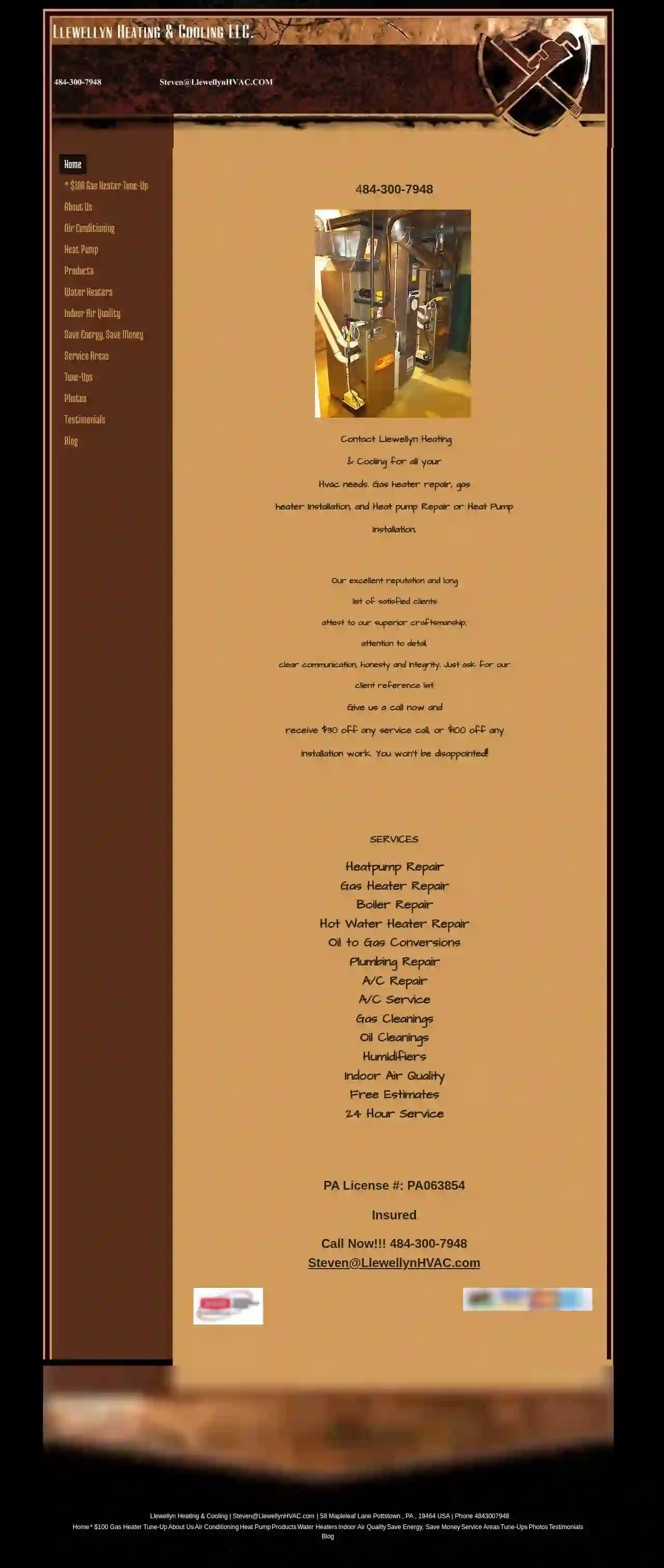
Llewellyn Heating and Cooling LLC.
4.713 reviews58 Mapleleaf Lane, Pottstown, 19464, GBLlewellyn Heating & Cooling is your trusted partner for all your HVAC needs. We pride ourselves on our excellent reputation and long list of satisfied clients, built on a foundation of superior craftsmanship, attention to detail, clear communication, honesty, and integrity. Don't just take our word for it; ask for our client reference list to hear firsthand about our commitment to customer satisfaction. Whether you need a gas heater repair, installation, heat pump repair, or installation, our experienced technicians are here to help. We offer a wide range of services, including: Heat Pump Repair Gas Heater Repair Boiler Repair Hot Water Heater Repair Oil to Gas Conversions Plumbing Repair A/C Repair A/C Service Gas Cleanings Oil Cleanings Humidifiers Indoor Air Quality We also provide free estimates and 24-hour service to ensure your comfort and peace of mind. Contact us today for a free consultation and experience the Llewellyn Heating & Cooling difference! Call Now!!! 484-300-7948 [email protected] Llewellyn Heating & Cooling | [email protected] | 58 Mapleleaf Lane Pottstown , PA , 19464 USA | Phone 4843007948
- Services
- Why Us?
- Accreditations
- Our Team
- Gallery
Get Quote
PJ MAC HVAC Service & Repair
Drexel Hill, PA, 642 Harper Ave, 19026, GBPJ MAC HVAC Air Duct Cleaning: Breath of Fresh Air in Pottstown & Beyond! Welcome to the home of PJ MAC HVAC Air Duct Cleaning—your local family-owned champion for pristine air quality and unbeatable HVAC solutions in the heart of Pennsylvania! Serving both residential and commercial entities with unmatched dedication. Connect with us now at (610) 672-3052! With integrity, we promptly fix what others can't. Ask About Joining Our Comfort Club! Our commitment is to the communities from Pottstown to Graterford. Your comfort is our neighborhood promise. Family-Driven Excellence: As a family-owned entity, we bring warmth, trust, and a personal touch to each job. You’re not just a client; you’re family. Mastery in Action: Our trained professionals provide only the top-tier service. Rest assured, we have the expertise to tackle any HVAC issue. Always Here for You: Questions? Urgent needs? Reach out to us directly at (610) 672-3052. We're here to serve, anytime.
- Services
- Why Us?
- Our Team
- Gallery
Get Quote
Over 12,692+ HVAC Businesses on our directory
Our HVAC experts operate in Coventry and surrounding areas!
HVACCompaniesHub has curated and vetted the Best HVAC Contractors arround Coventry. Find the most trustworthy pro today.
Frequently Asked Questions about Furnace Repair
- Natural Gas Furnaces: These are the most popular type, fueled by natural gas, which is generally readily available and relatively affordable in many areas. Natural gas furnaces tend to be efficient and have lower operating costs compared to oil or propane furnaces.
- Propane Furnaces: Propane furnaces are similar to natural gas furnaces but run on propane, which is stored in a tank on your property..
- Oil Furnaces: Oil furnaces burn heating oil as fuel, which is stored in a tank. Oil units may require additional considerations for fuel storage and delivery.
- Electric Furnaces: Electric furnaces are fueled by electricity. They are typically less expensive to purchase than gas furnaces, but they can be more expensive to operate depending on your electricity rates.
What is the difference between a single-stage and two-stage furnace?
Single-stage furnaces have only one setting, they either operate at 100% or are off. This can lead to temperature fluctuations and higher energy bills because the furnace is either running at its maximum setting or completely off..
Two-stage furnaces offer two levels of heat output: a lower setting for mild weather and a higher setting for colder temperatures. This allows the furnace to modulate its output based on the actual heating demand, resulting in more consistent temperatures, quieter operation, and improved energy efficiency.Two-stage furnaces provide enhanced home comfort and energy savings compared to single-stage models.
How do I relight my furnace's pilot light?
How often should I get my furnace inspected?
What are the different types of furnaces?
What is the difference between a single-stage and two-stage furnace?
Single-stage furnaces have only one setting, they either operate at 100% or are off. This can lead to temperature fluctuations and higher energy bills because the temperature fluctuates more than with two-stage furnaces.
Two-stage furnaces offer two levels of heat output: a lower setting for mild weather and a higher setting for colder temperatures. This allows the furnace to modulate its output based on the actual heating demand, resulting in more consistent temperatures, quieter operation, and improved energy efficiency. A two-stage furnace may be a more expensive initial investment, but it can provide greater comfort and savings over time.
How do I relight my furnace's pilot light?
How often should I get my furnace inspected?
What are the different types of furnaces?
- Natural Gas Furnaces: These are the most popular type, fueled by natural gas, which is generally readily available and relatively affordable in many areas. Natural gas furnaces tend to be efficient and have lower operating costs compared to oil or propane furnaces.
- Propane Furnaces: Propane furnaces are similar to natural gas furnaces These are a good option in areas where natural gas isn't accessible.
- Oil Furnaces: Oil furnaces burn heating oil as fuel, which is stored in a tank. They require more maintenance and tend to be less efficient than gas furnaces.
- Electric Furnaces: Electric furnaces are fueled by electricity. They are typically less expensive to purchase than gas furnaces, but they can be more expensive to operate depending on your electricity rates.